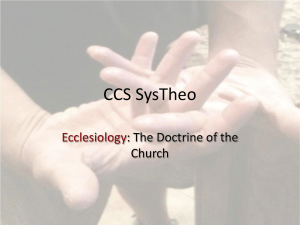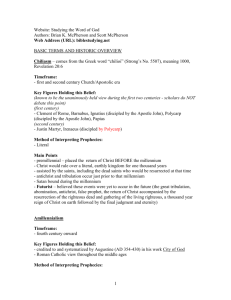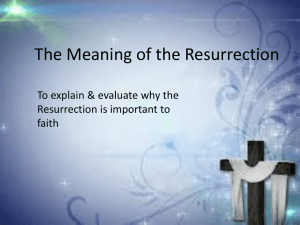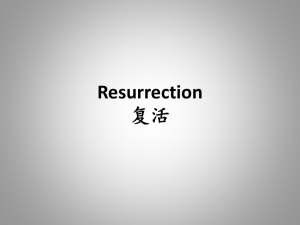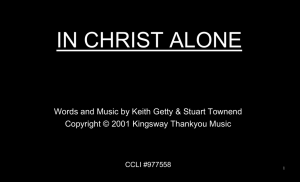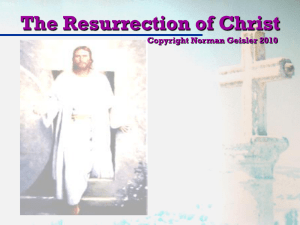20141108-SatPM-Kris_Braddock
advertisement
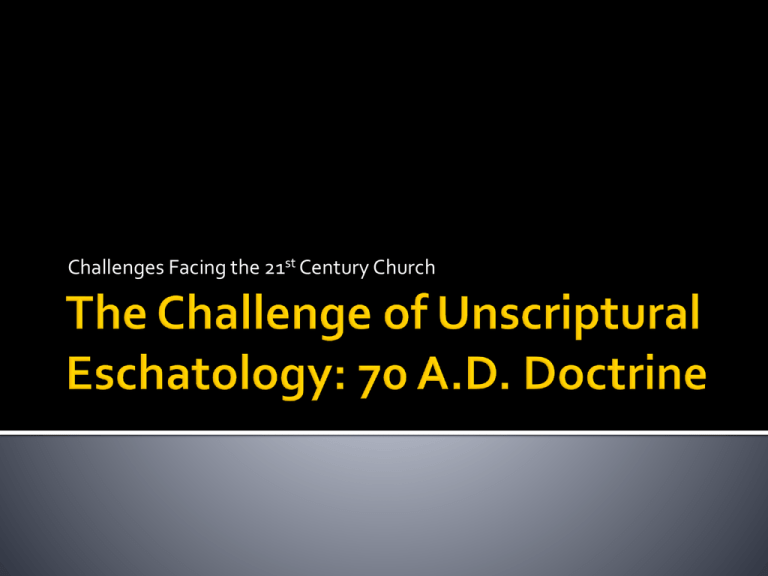
Challenges Facing the 21st Century Church eschatology, literally “study of last things” “theology concerned with death, judgment, and the final destiny of the soul and of humankind” 70 A.D. false doctrine has been around since the early 1900’s, though never popular saw a rise within the Lord’s church in the 70’s-80’s currently seeing a resurgence in churches sometimes causing divisions, sometimes not teaches that events we would associate with the end of time figuratively occurred in 70 AD with the destruction of Jerusalem second coming of Christ resurrection of the dead destruction of the world according to this doctrine, these have already happened and will not happen again… essentially redefines all references to the end of the world to be spiritual, not literal second coming of Christ judgment on Jews resurrection of the dead forgiveness of sins destruction of the world end of Judaism thus, prophecy was complete by 70 A.D. and destruction of Jerusalem was pivotal event of history, NOT death & resurrection of Christ concerning the second coming of Christ true, Scriptures speak of Christ coming to judge Jerusalem (Mt. 24:29-31; cf. v.15-16, 33-34; Is. 19:1) second half of chapter speaks of different event, literal coming at end of world (24:35-36; cf. v.1-3) DESTRUCTION OF JERUSALEM COMING OF THE LORD “days” (v.19, 22, 29) “know” (v. 15, 33) abnormal times (v.4-13) warning (v.32-33) time to flee (v.16) limit, local (v.15-22) imminent (v. 15-16, 34) judgment on earth (v.15-18) “day” (v.36, 42, 44, 50) “know not” (v.36, 42, 44, 50) normal times (v.37-42) no warning (v.43-44) no time to flee (v.39) universal (25:31-46) delayed (v.48, 50; 25:5, 19) judgment in Heaven (25:31) concerning the second coming of Christ true, Scriptures speak of Christ coming to judge Jerusalem (Mt. 24:29-31; cf. v.15-16, 33-34; Is. 19:1) second half of chapter speaks of different event, literal coming at end of world (24:35-36; cf. v.1-3) 2nd coming as literal as His going (Acts 1:9-11) clear sequence for the faithful (1 Thess. 4:13-18) clear sequence for the unfaithful (2 Thess. 1:6-10) concerning the resurrection of the dead true that Scriptures speak of spiritual resurrection in certain contexts (Rom. 6:1-7) others are literal (Jn. 5:28-29)(Acts 23:6-8) our resurrection as literal as Christ’s (1 Cor. 15) no bodily resurrection = no hope (v.12-19) Christ first, then us at His coming (v.20-24) will be a bodily resurrection (v.35-49) some won’t die, but all will be changed (v.50-58) concerning the destruction of the world true that Scripture sometimes uses apocalyptic language to indicate major events (Acts 2:14-21) others times it’s literal (2 Pet 3:1-13) judgment fire as literal as Noah’s flood the material world will pass away (v.10) what is left, our spirits and resurrected spiritual bodies, will then be sentenced (2 Cor. 4:16-5:10) if the truth is clear, why do some believe this? remember, Christians have long been deceived by clearly false doctrines (Gal. 1:6-7; 3:1)(1 Jn. 4:1-3) including false teachings about the resurrection (1 Cor. 15:12)(2 Tim. 2:16-18) ignoring contextual differences true that several prophecies, particularly OT, refer to the destruction of Jerusalem if not careful, though, one may accept premise that another passage must mean the same thing redefining simple passages from the difficult e.g. (1 Pet. 3:19; cf. 2 Cor. 5:10) instead, if you know the simple truth, let it bound your understanding of difficult passages do not be distracted or deceived (2 Pet. 3:14-18) it must appeal to their desires in some way prideful in finding “new knowledge”? (Col. 2:1-8) quality of man’s heart is tested by truth of God’s word (Mt. 13:18-23) are differences enough to affect fellowship? whichever one accepts, doesn’t affect their life or their faith…or does it? 70 A.D. doctrine has many consequences! overthrows faith (2 Tim. 2:16-18; cf. 1 Tim. 1:18-20) removes a source of hope and comfort (1 Cor. 15:16-19)(1 Thess. 4:13-18), a reason for pressing ahead (Phil. 3:11-12, 20-21) do we really have the same hope? (Eph. 4:1-6) how has such a non-lucrative false doctrine troubled churches for so long? precisely because brethren have allowed it to if we allow false doctrine to go unchecked and undisciplined, then should it surprise us when the unlearned and unstable fall prey to it? 1 I charge you therefore before God and the Lord Jesus Christ, who will judge the living and the dead at His appearing and His kingdom: 2 Preach the word! Be ready in season and out of season. Convince, rebuke, exhort, with all longsuffering and teaching. 3 For the time will come when they will not endure sound doctrine, but according to their own desires, because they have itching ears, they will heap up for themselves teachers; 4 and they will turn their ears away from the truth, and be turned aside to fables. 5 But you be watchful in all things, endure afflictions, do the work of an evangelist, fulfill your ministry.
